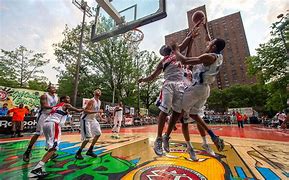
Courtesy of ESPN
by James C. Sherlock
Richmond Free Press (RFP) has editorialized about an issue of importance to all Virginians.
The editorial “Indoor basketball courts or outdoor courts? Why not both?” discusses the fact that the City of Richmond has late-stage plans for the construction of the new George Wythe High School that have secure entrances to indoor facilities and no plans for outdoor basketball courts.
RFP in its editorial makes a plea to the mayor and city council to let the adults and kids in the neighborhood use the high school as a community asset for recreational activities when the kids are not in school.
The RFP editorial board is spot-on.
It is or should be an issue all across the state.
Neighborhood basketball usually features pick a team, wait your turn, play-in and keep-the-court-until-you-lose rules. Small stuff like a 10-second rule for bringing the ball over half court (which seldom happens) are usually waived. If a player gets tired he won’t play much defense.
Mostly its fun. And competitive. Many neighborhoods have informal leagues. In some communities Parks and Rec runs them. In others, the players do. Same players most weekends. In tough neighborhoods, the courts are often neutral areas for disputes.
If the courts are lit, even better. In areas of high basketball demand, they should be. We are fortunate here in Virginia Beach to have excellent outdoor courts at a park along Shore Drive. The basketball played there is high level stuff.
Outdoor surfaces today can be long-lasting and very playable. And should be. No more asphalt that cracks and wrecks the playability of the court.
Security vs. recreation. The RFP editorial identifies the potential conflicts between school security and public recreation in school design.
I have to ask:
Do we have to trade one off for the other? Can kids and adults in an impoverished ward who would like to play basketball on the indoor and outdoor courts at the nearest school be accommodated? How about other sports across the state? The softball players? The soccer players in indoor and outdoor leagues? The American Legion teams?
As the RFP editorial illustrates, far better than I could, we should not simply shut off community use of school facilities in a search for school security. School and public safety officials must build both in as a cost of serving the public.
Naysayers will bring up legal tort liability; and cleanup costs; and off-hours security costs.
Well, it is the peoples’ liability and the peoples’ costs. As the editorial wrote of the new high school:
A wise choice is to install both indoor and outdoor basketball courts.
An indoor court will allow student athletes to practice and perfect their games in a state-of-the art facility with controlled climate settings, proper flooring, lighting and seating.
Installing an outdoor basketball court (or courts— yes, plural), in addition to the aforementioned advantages, informs the community that, despite the actual or perceived behaviors of some who may or may not live in the Wythe school district, there is trust.
That trust will be accompanied by accountability, and THEY — as gatekeepers, residents, staff, students and taxpayers — must ensure that trash, vandalism and other misguided acts do not destroy what has taken so long to build.
Get the churches involved. The non-profits. Local businesses.
Ask the police if they would rather have kids in tough neighborhoods playing basketball outdoors under the lights or hanging out looking for something else to do.
What to do. Leaders and planners must account for public use in the hours when school is not open in every security measure taken in new builds or renovations of existing schools. Extended use of school facilities is a way to leverage public investments through public enjoyment of public spaces.
We are spending enormous amounts of public money for those facilities. The new George Wythe High School will cost north of $140 million. Let communities be communities and use them as much as possible.
Parks and Recreation, not the schools, should shoulder the responsibilities.
If we can’t do that, who are we?


